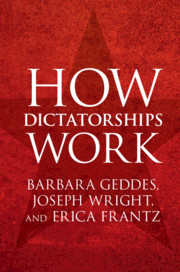Book contents
- How Dictatorships Work
- How Dictatorships Work
- Copyright page
- Dedication
- Contents
- Figures
- Tables
- Acknowledgments
- 1 Introduction
- Part I Initiation
- Part II Elite Consolidation
- Part III Ruling Society
- 6 Why Parties and Elections in Dictatorships?
- 7 Double-Edged Swords
- Part IV Dictatorial Survival and Breakdown
- References
- Index
6 - Why Parties and Elections in Dictatorships?
from Part III - Ruling Society
Published online by Cambridge University Press: 10 August 2018
- How Dictatorships Work
- How Dictatorships Work
- Copyright page
- Dedication
- Contents
- Figures
- Tables
- Acknowledgments
- 1 Introduction
- Part I Initiation
- Part II Elite Consolidation
- Part III Ruling Society
- 6 Why Parties and Elections in Dictatorships?
- 7 Double-Edged Swords
- Part IV Dictatorial Survival and Breakdown
- References
- Index
Summary
- Type
- Chapter
- Information
- How Dictatorships WorkPower, Personalization, and Collapse, pp. 129 - 153Publisher: Cambridge University PressPrint publication year: 2018



